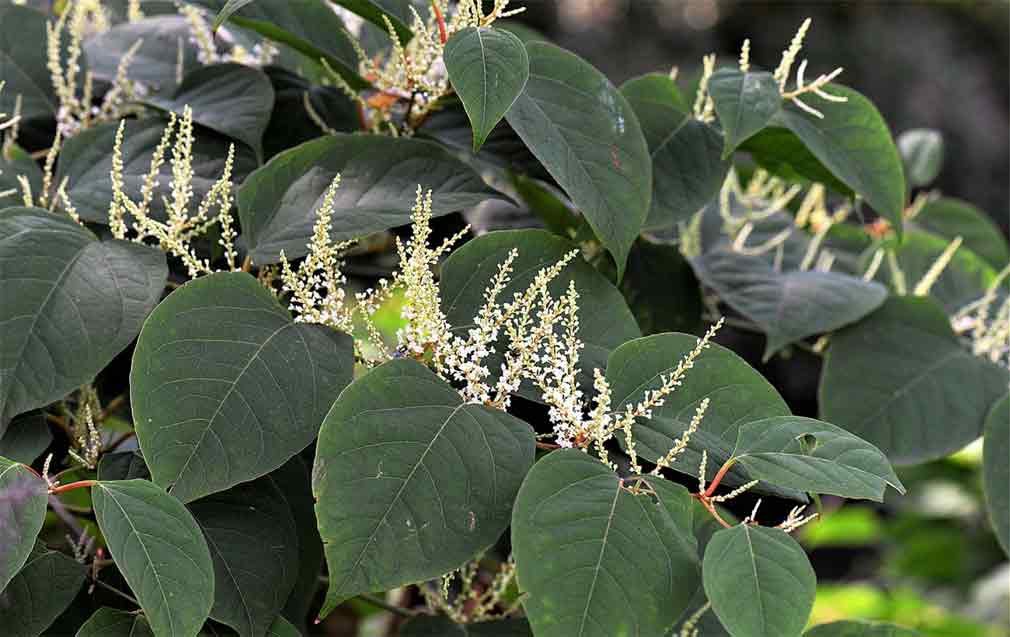
A new survey undertaken by a Japanese knotweed removal firm Environet, and undertaken by YouGov, highlights a nationwide lack of knowledge about this destructive plant.
A selection of Brits were asked to pick out this plant from five photographs, and a staggering 81% were unable to identify the plant correctly.
Surprisingly, 6% of participants confused knotweed with common Ivy, which is found in most British gardens.
What is Japanese knotweed?
Japanese knotweed was first introduced to this country from Japan in the middle of the 19th Century, and is considered to be the most invasive plant species in Britain.
Nowadays, it is commonly found on brownfield and wasteland sites. Its presence can add thousands to site costs.
How can you identify Japanese knotweed?
In spring, reddish-purple fleshy shoots emerge from crimson-pink buds at ground level, and look a little like asparagus stalks. These grow rapidly throughout the summer, up to 2.1m, and turn into tall canes, similar to bamboo. The canes have characteristic purple flecks.

Leaves tend to be shield or heart-shaped, and grow in an alternate fashion (in a zig zag pattern) along the stems. The stems die back to ground level in the winter, but the dry canes can remain for several months longer.

The creamy-white flowers are produced in late summer and early autumn, and reach up to 15cm per tassel.

Why is Japanese knotweed so bad?
Left untreated, Japanese knotweed will grow rapidly through the summer months, and push through cracks in concrete, cavity walls, and even drains, causing damage to a property.
Left to spread, the root systems underground will continue to expand and be much more costly to tackle.
You also run the risk of decreasing your overall property value. If it spreads onto neighbouring land, you can be sued for damages, and removal.
Selling a property
It is your responsibility to check the garden for Japanese knotweed. You will be asked to confirm by your solicitor/conveyancer if your property is affected by Japanese knotweed.
If it is, you will need to provide a management plan for its eradication from a professional company.
Buying a property
If the presence of Japanese knotweed has been declared, your mortgage lender will require assurances that it will be eradicated before agreeing the funds.
A management plan by a professional company, backed by a transferable guarantee, is sufficient, and is provided by the seller before the purchase is completed.
How to eradicate Japanese knotweed effectively
Non-chemical controls
When tackling Japanese knotweed, cultural control methods pose some problems.
- Digging out this plant without professional help, creates problems with disposal. Japanese knotweed is classed as ‘controlled waste’ under the Environmental Protection Act 1990. This means you must dispose of at licensed landfill sites.
- Specialist contractors must be registered waste carriers to safely remove the weed from site – make sure you check before employing anybody.
- Alternatively, it will be destroyed on site by allowing it to dry before burning.
Japanese knotweed should not be included with normal household waste or put out in green waste collection schemes.
Chemical controls
It usually takes at least three to four seasons to eradicate Japanese knotweed using weedkiller.
Professional contractors, however, will have access to more powerful weedkiller that may reduce this period by half.
When using weedkiller, always follow the instructions on the pack to make effective and economic use of the product. It’s important to minimise risks to people and the environment.
Trying to treat the knotweed yourself, will not get an insurance backed guarantee. You’ll need to use a professional company.
This will be important if you are planning to sell your property, or if a neighbour is threatening to sue from the spread.
Take a look at some other things you should be looking out for when viewing a property.
Feel free to call us with any queries, or check out our Estate Agents Facebook page for some of our fantastic reviews.
















